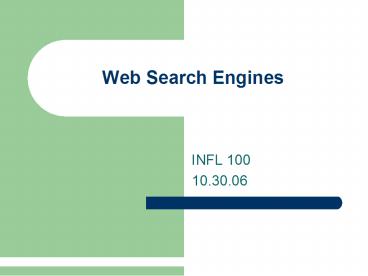Web Search Engines PowerPoint PPT Presentation
1 / 16
Title: Web Search Engines
1
Web Search Engines
- INFL 100
- 10.30.06
2
Web Search Engines
- Facts and Figures
- Search Engines- How do they work?
- Meta-Search Engines
- Specialized Search Engines
3
Size of the Web
- The web is ENORMOUS (estimates)
- 1997- 125 million pages
- 1999- 320 million pages
- 2001- 1-3 billion pages
- 2003- 4 billion - ??
4
Web Search Engines
- What is a web search engine and how do they work?
- A web search engine is an interactive tool that
enables users to locate information available via
the World Wide Web. - Search Engines
- Google, Yahoo, Northern Light, 100s more
- Meta-Search Engines
- Metacrawler, Dogpile
5
Web Search Engines
- When you use a search engine, you are not
searching the web directly. The web is the
totality of many web pages residing on many, many
computers or servers throughout the world. Your
computer can not possibly find or go to them all.
- You can access any one of several intermediate
databases that link you to selections of web
pages. (i.e. search engines)
6
Web Search Engines
- A search engine is made up of 4 main parts
- 1.) the engine's spiders 2.) the indexing
program 3.) the retrieval engine 4.) the
graphical interface
7
Web Search Engines
- 1. Spiders
- Most databases are created automatically using
spiders (also known as robots or crawlers) - Spiders go out to the Web and identify new sites
that are to be added to the database and identify
sites already covered that have changed. - Generally, the more popular sites are crawled
more often and more thoroughly. - When you use a Web search engine, you search the
compiled database, not the actual Web.
8
Web Search Engines
- Freshness refers to how frequently the
information in the database is updated. - If database has not been updated for two months,
users are actually searching the Web as it was
two months previously. - It is sometimes hard to tell how fresh a database
really is. - Some prominent parts of a database may be updated
more often than the bulk of the database.
9
Web Search Engines
- 2. The Indexing Program
- What is included? Some search engines claim to
index every word from every page. But what do
they consider a word? - Stop words are often left out - articles and
conjunctions. However, some engines don't index
high frequency words such as web and Internet, or
numbers. - Some do not index frames - causing the loss of
many relevant hits - -example Frames
10
Web Search Engines
- 3. The Retrieval Engine
- The retrieval engine is the program that receives
your query and - searches the database to identify and deliver
records that match - your query.
- Two Major things are happening
- the retrieval engine identifies the matching
records via a retrieval algorithm - the retrieval engine arranges the retrieved items
in a particular order to be displayed to you the
user - Retrieval Algorithms utilize matching criteria to
determine which - records contain particular words, phrases, and
combinations. They - may also match other user-specified criteria such
as whether a - page contains audio or film images.
11
Web Search Engines
- 4. The Graphical Interface (GUI)
- Users see and interact with an HTML-based
interface. - The interface allows the user to input a query
but also provides a space for advertisers, add-on
features such as directories, sites for stock
market information, links to chat rooms, free
email, etc. and links to help pages. - May also offer special interfaces for searching a
single type of file audio, image, video, etc.
12
Meta-Search Engines
- What are Meta-Search Engines? What are their
limitations? - A meta-search engine allows you to search several
search engines and their databases at one time,
often very quickly. - Meta-search engines can be useful if you are
looking for a unique term or phrase. - BEWARE!
- Meta-search engines only spend a short time in
each database - and often retrieve only 10 of any of the results
of any - database queried
- Metacrawler Dogpile
13
General-Purpose Versus Specialized Web Search
Engines
- General-purpose Web search engines (AltaVista,
Lycos, Google, et al.) retrieve hits on just
about any topic from anywhere on the open Web. - Specialized Web search engines may search only a
single Web site or single area of interest. - FirstGov retrieves only U.S. government
information - NewsIndex retrieves only current news items.
- Specialized Web search engine may be more precise
than engines that search the open Web.
14
Disadvantages
- The Deep Web
- Large sections of the Web are invisible to Web
search engines. - All proprietary Web-based information
resourcesAcademic Search Elite, biography
Resource Center, etc.cannot be searched via Web
search engines. - Many open-access resources, such as PubMed,
cannot be searched via Web Search engines. - No search engine of any type can claim to search
the entire Web.
15
Disadvantages
- Pay for Position Advertising
- Owners of Web sites may pay owners of Web search
engines for prominent positioning. - Widgets Unlimited might pay lycos.com so that
WidgetsUnlimited.com is at the top of the list
for any search involving the word widget.
16
Disadvantages
- Pay for Position Advertising
- Web search engines accept advertising.
- An ad for sinus medicine appears at the top of
the results page following a search on the phrase
runny nose. - Pay-for-positioning and advertising compromise
objectivity of Web search engines. - Is this the best information available, or simply
the best financed information?

